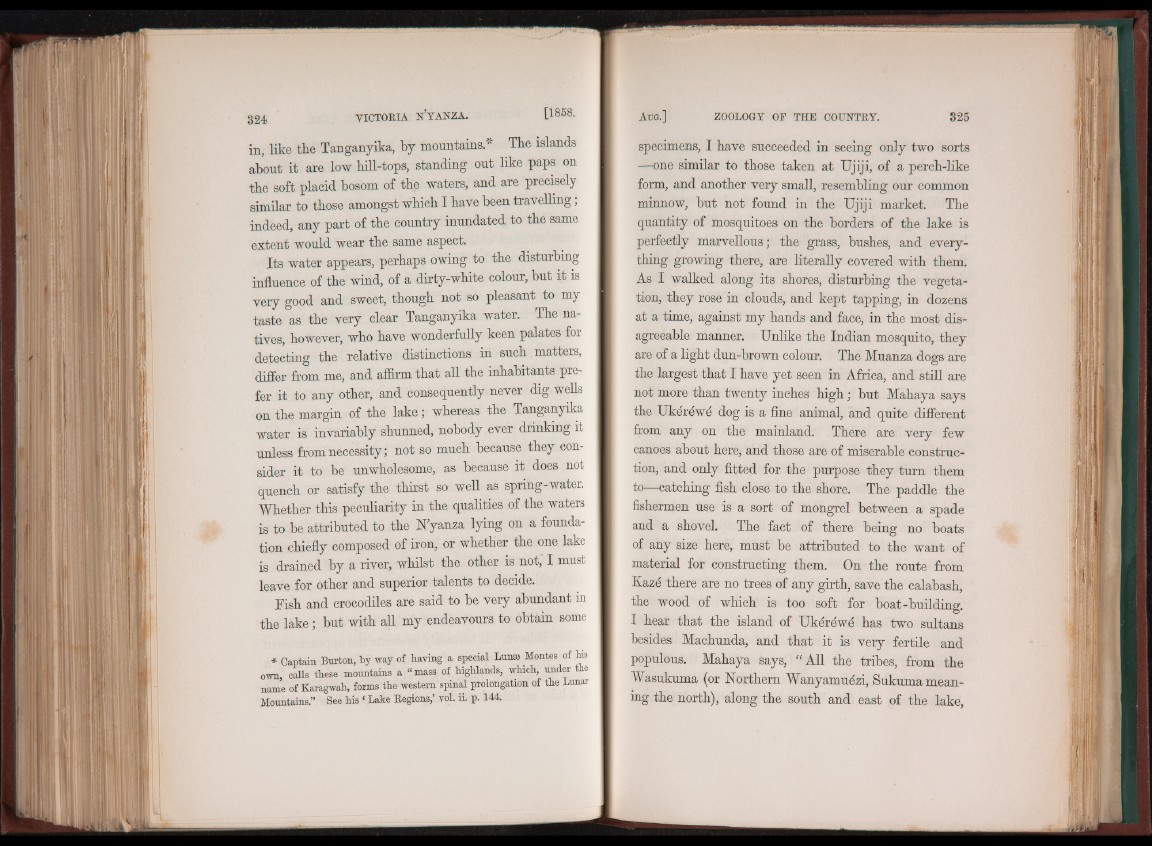
in, like the Tanganyika, by mountains.* The islands
about it are low hill-tops, standing out like paps on
the soft placid bosom of the waters, and are precisely
s imilar to those amongst which I have been travelling,
indeed, any part of the country inundated to the same
extent would wear the same aspect.
Its water appears, perhaps owing to the disturbing
influence of the wind, of a dirty-white colour, but it is
very good and sweet, though not so pleasant to my
taste as the very clear Tanganyika water. The natives,
however, who have wonderfully keen palates for
detecting the relative distinctions in such matters,
differ from me, and aflBrm that all the inhabitants prefer
it to any other, and consequently never dig wells
on the margin of the lake; whereas the Tanganyika
water is invariably shunned, nobody ever drinking it
unless from necessity; not so much because they consider
it to be unwholesome, as because it does not
quench or satisfy the thirst so well as spring-water.
Whether this peculiarity in the qualities of the waters
is to be attributed to the N’yanza lying on a foundation
chiefly composed of iron, or whether the one lake
is drained by a river, whilst the other is not, I must
leave for other and superior talents to decide.
Fish and crocodiles are said to be very abundant in
the lake; but with all my endeavours to obtain some
* Captain Burton, by way of having a special Lunse Montes of his
own, calls these mountains a “mass of highlands, which, under the
name of Karagwah, forms the western spinal prolongation of the Lunar
Mountains.” See his £ Lake Regions,’ vol. ii. p. 144
specimens, I have succeeded in seeing only two sorts
—one similar to those taken at Ujiji, of a perch-like
form, and another very small, resembling our common
minnow, but not found in the Ujiji market. The
quantity of mosquitoes on the borders of the lake is
perfectly marvellous; the grass, bushes, and everything
growing there, are literally covered with them.
As I walked along its shores, disturbing the vegetation,
they rose in clouds, and kept tapping, in dozens
at a time, against my hands and face, in the most disagreeable
manner. Unlike the Indian mosquito, they
are of a light dun-brown colour. The Muanza dogs are
the largest that I have yet seen in Africa, and still are
not more than twenty inches high; but Mahaya says
the Ukerdwe dog is a fine animal, and quite different
from any on the mainland. There are very few
canoes about here, and those are of miserable construction,
and only fitted for the purpose they turn them
to—catching fish close to the shore. The paddle the
fishermen use is a sort of mongrel between a spade
and a shovel. The fact of there being no boats
of any size here, must be attributed to the want of
material for constructing them. On the route from
Kaze there are no trees of any girth, save the calabash,
the wood of which is too soft for boat-building.
I hear that the island of Ukdrewd has two sultans
besides Machunda, and that it is very fertile and
populous. Mahaya says, “ All the tribes, from the
Wasukuma (or Northern Wanyamudzi, .Sukuma meaning
the north), along the south and east of the lake,